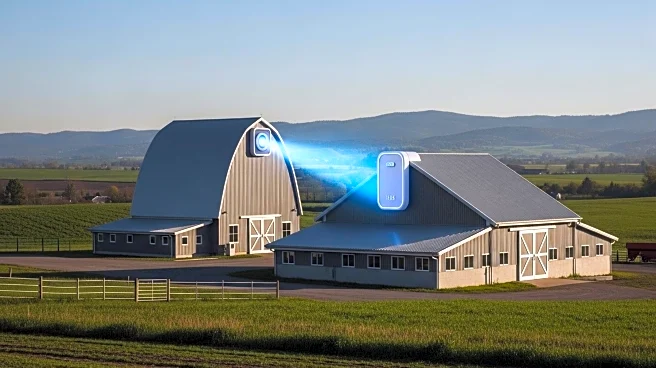What's Happening?
Hoofprint Biome, a spinout from NC State University, has successfully raised $15 million in investment capital to advance its enzyme-based feed additives aimed at reducing methane emissions from cattle. Founded by NC State Ph.D. graduates Kathryn Polkoff and Scott Collins, the company is part of a new wave of ag-tech startups emerging from the university's innovation ecosystem. The funding will enable Hoofprint Biome to expand its team, accelerate research and development, and transition from the Seed2Grow incubator to its own facilities. The company's technology not only targets methane emissions but also enhances productivity in dairy and beef operations, offering a dual benefit of environmental sustainability and economic gain.
Why It's Important?
The development of Hoofprint Biome's technology is significant in addressing the pressing issue of livestock methane emissions, which contribute substantially to global greenhouse gases. By reducing these emissions, the company is helping to mitigate climate change impacts while simultaneously improving the productivity of livestock operations. This positions Hoofprint Biome at the forefront of climate-smart agriculture, offering a solution that aligns with both environmental goals and the economic interests of farmers. The successful funding round reflects investor confidence in the scalability and market potential of the company's innovations, highlighting the growing importance of sustainable technologies in the agricultural sector.
What's Next?
With the new funding, Hoofprint Biome is poised to move from pilot projects to commercial adoption of its enzyme-based feed additives. The company plans to expand its operations and continue developing its technology to meet the demands of the livestock industry. As it transitions to larger facilities, Hoofprint Biome will also open opportunities for other startups to enter the Seed2Grow incubator, fostering further innovation in the ag-tech space. The company's progress will be closely watched by agribusiness leaders and investors seeking sustainable solutions to reduce emissions and enhance productivity.
Beyond the Headlines
Hoofprint Biome's journey from an academic spinout to a promising ag-tech company underscores the potential of university-driven innovation to create impactful commercial technologies. The company's success illustrates how collaborative ecosystems, like the one fostered by NC State's Seed2Grow program, can accelerate the development of startups with the potential to reshape markets. As global agriculture continues to seek pathways to reduce emissions and improve resource efficiency, Hoofprint Biome's model of combining sustainability with profitability could serve as a blueprint for future innovations in the sector.








